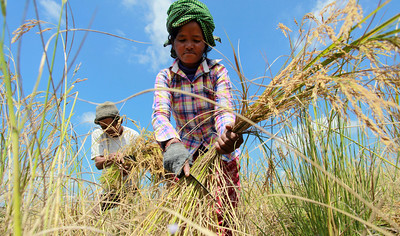Why a Health Summit on Food Systems?

Photo Credit: Chor Sokunthea / World Bank
Food lies at the heart of both health and sustainable development, yet our current food system is “making us ill, driving climatic change and undermining the health of ecosystems and the essential services on which our health and well-being depend (WHO). COVID-19 and the war in Ukraine have made matters worse and sparked a global food crisis. As always, it is the most marginalized and excluded who are the hardest hit.
To tackle the growing threats to our planet and health of a growing population, we need a shift towards healthier, more equitable and sustainable food systems. This means changing the way we think about, produce, distribute, consume, dispose of and value food.
So, what can be done?
In recognition of the urgency and the scale of the challenge, the United Nations organized a first-ever Food Systems Summit in September 2021. The Summit, which had as a goal to awaken the world to the fact that we all must work together to transform the way the world produces, consumes and thinks about food
followed after a 18-month process in which 148 countries had hosted national dialogues to develop national strategies. The Summit resulted in large number of joint initiatives, coalitions and pledges to support countries in implementing and urging the international community to step up their support.
From a health perspective, the WHO urged a focus on five interconnected and interrelated areas: unhealthy diets and food insecurity; zoonotic pathogens and antimicrobial resistance; unsafe foods; environmental contamination and degradation as well as occupational hazards.
Policymakers in every country must now pave a way forward based on their own circumstances and constraints - from “farm to fork”, making use of innovation and collaboration across sectors, and together with civil society, industry and academia to ensure a people-centered, equitable and evidence-based approach.
Uppsala Health Summit 2022 – Healthy Lives from Sustainable Food Systems
Through our well-established science-to-policy platform, Uppsala Health Summit 2022 aims to support the implementation in the follow-up to the UN Summit. Our aim is to provide an arena for how we can practically bring forward the recommendations from this autumn’s Food Systems Summit with a special emphasis on food systems impact on health. In nine different workshops and plenary dialogues, we will discuss:
- Actions that improve the production and increase supply of foods needed to support healthy diets, in crisis as well as in stable times – including agile solutions for adaptation of production systems, species, and breeds, greater recognition of the role of smallholder farmers and policies that can protect from unsafe foods and antimicrobial resistance.
- Actions that make healthy diets more accessible through the integration of food perspectives into spatial planning and into local, national, and global food strategies.
- Actions that enable, motivate and empower people everywhere to to prepare and eat healthy diets produced using environmentally sustainable practices. One workshop will focus on the equity perspective in the shift towards more sustainable food systems.
We aim for a dialogue where all participants can gain knowledge and new ideas that can be adapted for local contexts, as well as contacts and opportunities for future collaborations, across sectors, policy boundaries and academic disciplines.
What is a Sustainable Diet?

Simone D. McCourtie World Bank
The EAT-Lancet Commission has published guidance on what, and how much, people should eat to be healthy and reduce the environmental impact of food systems. The specific foods and quantities vary across different regions of the world, but the recommended diet generally includes higher amounts of fruits and vegetables, whole grains, nuts and legumes, and lower quantities of red and processed meat, refined grains and starchy vegetables.
A healthy, sustainable diet needs to come from a sustainable food system: one that ensures food and nutrition security for everyone, without compromising the economic, social and environmental capacity of future generations to achieve the same. Adapting diets to be more climate-resilient is central to the notion of a sustainable food system.
Source: FAO (2018) Sustainable food systems: concepts and framework.
